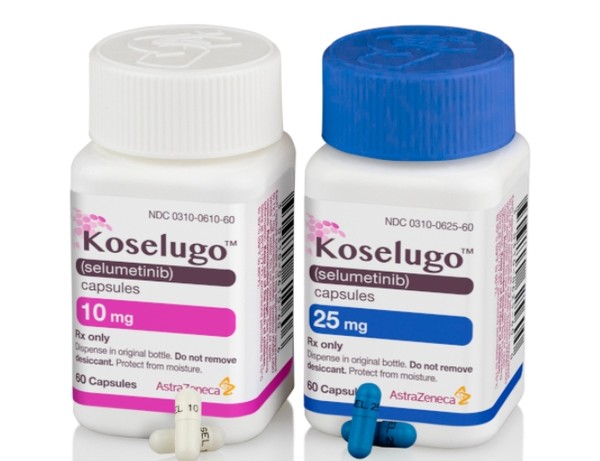AstraZeneca said Monday that the Ministry of Food and Drug Safety has approved Koselugo (ingredient: selumetinib) for treating pediatric patients with neurofibromatosis type 1 (NF1) above three years old.

The Korean regulator approved the drug to treat NF1 patients accompanying plexiform neurofibroma and showing symptoms but cannot receive surgery based on the results of phase 2 SPRINT clinical trials led by the U.S. National Cancer Institute.
NF1 is a disease that can cause developmental anomalies in the nervous system, bones, and skin due to mutations or defects in particular genes. NF1 patients can suffer complications, including pain, dysfunction, injury, and benign and malignant tumors, and 20 to 50 percent of them might develop plexiform neurofibroma.
SPRINT study was conducted with 50 NF1 patients aged between three and 17 with inoperable plexiform neurofibroma.
Thirty-four patients, or 68 percent of 50 subjects, showed partial response as of 29 March 2019, and 28 showed durable responses lasting longer than a year.
Patients took 25 milligrams per square meter of Kocelugo twice a day until disease progression or adverse reactions appeared, and researchers periodically checked tumor size changes and tumor-related disease conditions.
Researchers measured the overall response rate by checking the share of patients whose neurofibroma size decreased by more than 20 percent through periodic magnetic resonance imaging (MRI) at least three months apart.
The most common adverse events were nausea, vomiting, and diarrhea, and 14 patients received a reduced dose of Koselugo, and five discontinued the treatment. However, none of the patients showed symptomatic changes in the left ventricular ejection fraction or had retinal serous detachment or symptoms affecting vision.
Koselugo was designated as a drug for fast-track review by the ministry in October 2020 due to the urgent need for treating NF1, which is a life-threatening disease with no available therapies.
“We are glad to give hopes to people with NF1, a rare and intractable disease with no treatment, with the recent approval of Koselugo in Korea,” said Myeong Jin, executive director for AstraZeneca Oncology Business Unit. “We will try to deliver the drug to patients quickly as the urgent need of it has been recognized by the ministry.”

